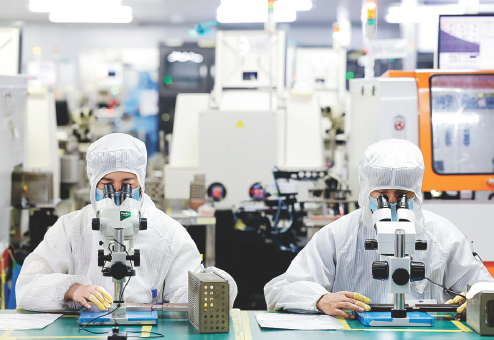Homegrown auto chips seen as key
By MA SI,CHENG YU and LI FUSHENG | China Daily | Updated: 2022-04-02 09:36

More efforts are needed to beef up the development of the auto chip industry in the Chinese mainland as semiconductors become essential to vehicles that are increasingly getting electric, connected and smarter, experts said on Friday.
Dong Yang, co-chairman of the China Automotive Chip Industry Innovation Strategic Alliance, an organization dedicated to promoting the development of the homegrown auto semiconductor sector, said:"Currently, we rely heavily on the import of crucial auto chips. Though the Chinese mainland accounts for more than 30 percent of global sales of cars, homegrown companies produce only about 5 percent of the global auto chips."
According to him, it is important to cultivate competitive local auto chip companies that can help carmakers better deal with chip supply challenges and possible export restrictions imposed by other countries amid geopolitical uncertainties.
This week, South Korean online news publisher Business Korea cited anonymous sources as saying that the US government proposed setting up a semiconductor industry alliance with its allies, including South Korea and Japan, to keep the Chinese mainland's fledgling semiconductor industry at bay.
Dong said:"We are striving for a healthier proportion of local chip production so that we can rely on ourselves whenever an emergency arises. Meanwhile, we will continue expanding international cooperation, given that chips and cars are both highly globalized industries."
Miao Wei, former minister of industry and information technology, also said at a conference last week that the auto industry in the Chinese mainland lacks "chips and souls", or crucial chips and operating systems, especially in vehicle regulation-level components.
Vehicle regulations are requirements that automobiles must satisfy in order to be approved for sale or use in a particular country or region.
"In the past, automakers basically ignored the production of chips and (the research and development of) operating systems and left them to suppliers. While our automakers did little, foreign automakers have begun to invest in Taiwan Semiconductor Manufacturing Company, a major chipmaker, for more production capacity," he said.
Miao also said the auto industry in the Chinese mainland had gained some momentum in the first half of the "game", or in the development of new energy vehicles, but the winning hand still lies in the second half of the game, which is the development of intelligent connected vehicles.
"We are confident and capable of doing well in the second half of the game, so long as more efforts can be made to give full play to our advantages in institutional systems and mechanisms, market potential, as well as information and communication technologies," he said.
Roy Lu, an independent auto analyst based in Shanghai, said local carmakers have shown much interest in latest chips for smart vehicles, but they are little involved in the production of micro controller units, better known as MCUs, that assist automotive applications from motor control to infotainment systems and auto body control.
He explained that MCUs are less profitable and the need for them will become smaller as vehicles are becoming computers on wheels.
"But carmakers cannot get enough chips by pressuring auto parts makers alone. They should at least invest together to scale up capacities. Such investment is necessary for the time being," Lu said.
Some largest Chinese carmakers have started efforts in that direction already. Gan Jiayue, CEO of Geely Auto, said the company is optimizing its supply chain by strengthening cooperation with chipmakers.
"In fact, we now have set up dialogues with over 130 chipmakers, and we are purchasing some chips directly from them," said Gan.
























